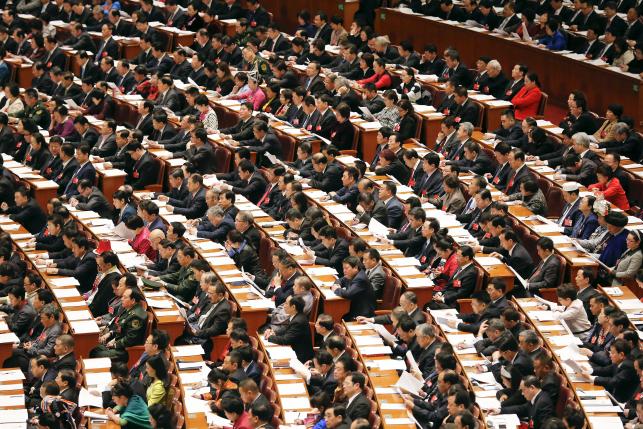Reuter’s Megha Rajagopalan reports that China’s top legislative body is in the process of deliberating the country’s first charity law at this year’s parliamentary session. The proposed legislation aims to boost donor confidence, but critics warn it could impose too many restrictions and exclude groups that conduct politically sensitive work. A full English translation of the draft law is available from China Law Translate.
The law, expected to be passed during the current parliamentary session, would relax rules on fund-raising and cut red tape, while adding transparency measures for donors in the world’s second-largest economy.
It is expected to provide a boost for China’s sluggish non-profit sector that has trailed a growing middle class and expanding league of wealthy entrepreneurs.
But some analysts cautioned that the law is unlikely to protect groups that deal with human rights and related issues, which have been subject to a broad crackdown under President Xi Jinping. [Source]
In a separate report, Reuter’s Megha Rajagopalan writes that the new law would prohibit charities from carrying out or sponsoring activities that “endangers national security,” a provision that would enable authorities to take actions against groups that are deemed politically threatening.
“Charities shall not carry out or sponsor any activity that endangers national security or public interests,” Li Jianguo, vice chairman of the standing committee of the National People’s Congress, China’s parliament, said in an explanation of the law.
He did not elaborate on what might constitute endangering national security.
[…] Charities found to be undermining national security would be punished or have their registrations revoked in serious cases, the official Xinhua news agency reported. [Source]
At the South China Morning Post, Mandy Zuo looks at how the new registration and fundraising regulations laid out in the proposal could negatively impact the operation of China’s charities:
It would also prohibit charities from launching public campaigns within two years of being officially registered.
Offline appeals for public donations could only be conducted within the area the organisation was registered.
“These limitations would pose a big challenge for the survival of newly registered charities because public appeals are an essential source of funding for them,” said Zhang Gaorong, assistant director of the China Philanthropy Research Institute. [Source]
The law’s ability to address red tape, lack of public trust, and limited contribution from the wealthy will likely determine its effectiveness in advancing the country’s charity sector. South China Morning Post’s Mandy Zuo reports:
Part of the problem is the administrative barriers to setting up a charity on the mainland. At the moment all charitable groups must be affiliated with a government organisation before being registered with the Ministry of Civil Affairs. If passed, the law would scrap that requirement.
Another issue is the lack of public trust in charities.
The reputation of the sector as a whole took a battering five years ago with the Guo Meimei saga. Guo, a young woman, falsely claimed to work for the state-backed Red Cross Society of China and openly flaunted her wealth and extravagant lifestyle on social media. In the aftermath, the organisation was criticised for poor management and misuse of donations.
[…] A third problem is the example being set at the top. China’s richest man, Wang Jianlin, and billionaire Jack Ma both donated less than 0.3 per cent of their total net worth last year, according to a report by the Ash Centre for Democratic Governance at Harvard Kennedy School. [Source]
Some observers have also warned that the new law needs to do more to limit management fees, which are currently set at a maximum rate of 15 per cent, to prevent potential misuse of public of charitable funds.
Meanwhile, The New York Times’ Didi Kirsten Tatlow reports that the Chinese government’s plan to pass a draft Foreign NGO Management Law has been delayed, a signal likely indicating that an internal debate over the draft law’s international repercussion is still in progress. If passed, the new law would require foreign non-governmental organizations to register with the Ministry of Public Security and operate under an official sponsor.
She [Congress spokeswoman Fu Ying] appeared to say that action on the law was uncertain. “It has still not yet been definitely decided which session of the Standing Committee will submit the review,” Ms. Fu said. “We still have to deal with various recommendations and opinions in order to revise this law well.”
[…] A Western diplomat, speaking on the condition of anonymity because he was not authorized to discuss the subject, said that Ms. Fu’s comments “could be code for the fact that it” — the latest draft — “has been passed over, because she didn’t attach a definite time frame for when they would be finished.”
Although the government and security forces probably did not heed the opinion of human rights nongovernmental organizations, they might listen to other groups, he said.
[…] Still, the diplomat expected a law to be passed, noting that Foreign Minister Wang Yi had raised the issue in the United States last year. “Wang Yi was in D.C. and said, ‘You can’t have an environment in which these organizations operate without some kind of law,’ ” he said. [Source]
The draft Foreign NGO Management Law was one of several recently passed or drafted laws characterized by The New York Times’ Edward Wong as being aimed at “ideological security.” Like other laws with a distinctly ideological component, the NGO draft law also met criticism for being too vague. After foreign diplomats issued a joint letter on concerns with this type of legislation, NPC Standing Committee chairman Zhang Dejiang defended what he called a “distinctly Chinese approach” to national security.








